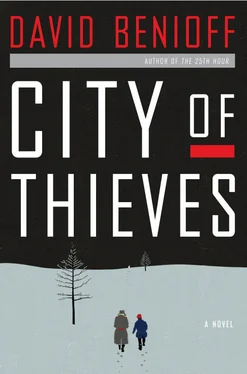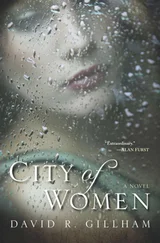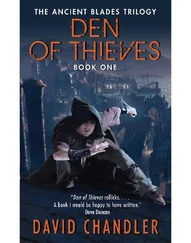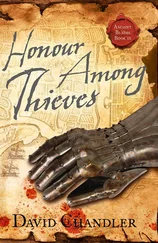At one point Vika and Kolya argued about which direction to walk. Vika ended the discussion with an impatient shake of her head, marching off without checking to see if we would follow. After the Mga debacle I had no faith in Kolya’s ability to navigate; I followed her. Kolya held his ground for all of eight seconds before hurrying after us.
Somewhere along the way I told her the true story of why Kolya and I had snuck out of Piter, crossed enemy lines, and eventually stumbled onto the farmhouse beneath the larches. I kept my voice low so Kolya would not hear, though I couldn’t imagine whom I was betraying. I told her about the colonel’s daughter, skating on the Neva; the cannibals and their grisly wares hanging from the ceiling chains; the dying boy Vadim and his rooster, Darling; the antitank dog bleeding in the snow; and the dead Russian soldier rooted in the ice. When I finished the story, Vika shook her head but said nothing, and I worried that I had told her too much.
Watching her march through the woods, silent and tireless, the submachine gun strapped to her shoulder, I remembered what Kolya had told me the previous morning. The war had changed everyone, but still, it was difficult to believe she had been an astronomy student seven months earlier.
“May I ask you something?”
She kept walking, not bothering to answer. She didn’t have time for inane questions like “May I ask you something?”
“Kolya says you’re NKVD.”
“Are you asking?”
“I guess so.”
“What do you think?”
“I don’t know,” I said, but the moment I spoke the words I realized I did know. “I think he’s right.”
She peered through the darkness, looking for some kind of landmark to clarify which way we were going.
“Does it bother you?”
“Yes.”
“Why?”
“Because of my father.” I realized she didn’t know what happened to my father, so I added, quietly, “They took him.”
For nearly a minute we walked in silence, climbing a slowly sloping hill. I began to pant, the weakness returning to my legs as we moved farther from the victory at Krasnogvardeysk.
“Your father was a writer, yes? Then the odds are very good other writers turned him in. The police were just doing their jobs.”
“Yes. And the Einsatz, as well. Of course, they chose their jobs.”
“If it changes anything, they took my father, too.”
“Really? Was he a writer?”
“No. He was NKVD.”
Cresting the long hill took us nearly an hour and stole all the spring from my legs, but when we finally got to the top of the treeless rise, I saw why Vika had chosen to come this way. The half-moon shone across the outstretched hectares of forest and farmland, all of it shimmering beneath a layer of frost and snow.
“Look,” she said, pointing north. “Do you see it?”
Far beyond the valley below us, past the hills that blocked the horizon in the shadowy distance, a slender pillar of light rose to the sky, bright enough to spotlight the cloud far above. The powerful beam began to move, a brilliant saber carving the night, and I realized I was looking at an antiaircraft searchlight.
“That’s Piter,” she told us. “You get lost on your way home, that’s your North Star.”
I turned to look at her. “You’re not coming with us?”
“There’s a band of partisans outside of Chudovo. I know the commander. I’ll try to connect with them.”
“I’m sure the colonel can give us an extra ration card if you come with us. I’ll tell him you helped us and he’ll—”
She smiled and spat on the ground. “Fuck the ration card. Piter’s not my city. I’m needed out here.”
“Don’t get killed,” said Kolya. “I think the boy is in love.”
“Stay off the roads on your way back. And be careful getting into the city. We’ve got mines everywhere.”
Kolya extended his gloved hand. Vika rolled her eyes at the formality but shook it. “I hope we meet again,” he told her. “In Berlin.”
She smiled and turned to me. I knew I would never see her again. When she saw the look on my face, something human entered those wolfish blue eyes. She touched my cheek with her gloved hand.
“Don’t look so sad. You saved my life tonight.”
I shrugged. I was afraid that if I opened my mouth I would say something mawkish and stupid, or worse, that I would start to cry. Five years had passed since I had cried, but I had never lived through a night like this one, and I was convinced that the sniper from Archangel was the only girl I would ever love.
Her gloved hand still rested on my cheek. “Tell me your last name.”
“Beniov.”
“I’ll track you down, Lyova Beniov. All I need is the name.” She leaned forward and kissed me on the lips. Her mouth was cold, her lips rough from the winter wind, and if the mystics are right and we are doomed to repeat our squalid lives ad infinitum, at least I will always return to that kiss.
A moment later she walked away from us, head down, rabbit fur cap brimmed low, chin tucked into her scarf, her little body in the oversize coveralls dwarfed by the ancient pines around her. I knew she would not look back at me, but I watched her anyway until she was gone.
“Come,” said Kolya, wrapping his arm around my shoulders. “We have a wedding to attend.”
The snow had melted in the daylight and frozen again at night, making for a treacherous walk, a skin of frost cracking with every step we took. My finger hurt so much it was hard to think about anything else. We kept walking because we had to keep walking, because we had come too far to stop now, but I do not know where the energy for each footfall came from. There is a place beyond hunger, beyond fatigue, where time no longer seems to move and the body’s misery no longer seems fully your own.
None of this applied to Kolya. He had eaten as little as I had, though he had slept better the night before in the toolshed with the illiterates, as comfortable as if he lay on a feather bed in the Europa Hotel. While I slogged north with my head down, Kolya gazed around at the moonlit countryside like an artist on a stroll. We seemed to have all of Russia to ourselves. For hours we saw no sign of humanity aside from the abandoned farm fields.
Every few minutes he would reach inside his coat, making sure that his sweater remained tucked inside his belted pants and the box of eggs was secure.
“Have I told you the story of the courtyard hound?”
“Your novel?”
“Yes, but where the title comes from.”
“Probably.”
“No, I don’t think I have. The hero, Radchenko, lives in an old building on Vasilevsky Island. A house really, built for one of Alexander’s generals, but now it’s falling apart, eight different families living there and none of them like one another. One night, the middle of winter, an old dog walks into the courtyard, lies down by the gate, and makes the place his home. A big old beast, his muzzle gone gray, one of his ears chewed off in some fight ages ago. Radchenko wakes up late the next morning, looks out his window, and sees the dog lying there with his head between his paws. He feels sorry for the poor fucker; it’s cold and there’s nothing to eat. So he finds a bit of dry sausage and opens his window, just as the church bells start ringing for noontime.”
“What year is this?”
“What? I don’t know. 1883. Radchenko whistles and the dog looks up at him. He tosses down the sausage, dog gobbles it down, Radchenko smiles, closes the window, and gets back in bed. Now remember, at this point he hasn’t left his apartment in five years. The next day, Radchenko’s still sleeping when the church bells ring at noon. When the bells go quiet, he hears a bark outside. And then another one. Finally, he crawls out of bed, opens the window, looks down to the courtyard, and sees the hound staring up at him, tongue dangling from his mouth, waiting to be fed. So Radchenko finds something to toss the old boy, and from then on, every time the church bells ring at noon the dog waits beneath the window for his lunch.”
Читать дальше












